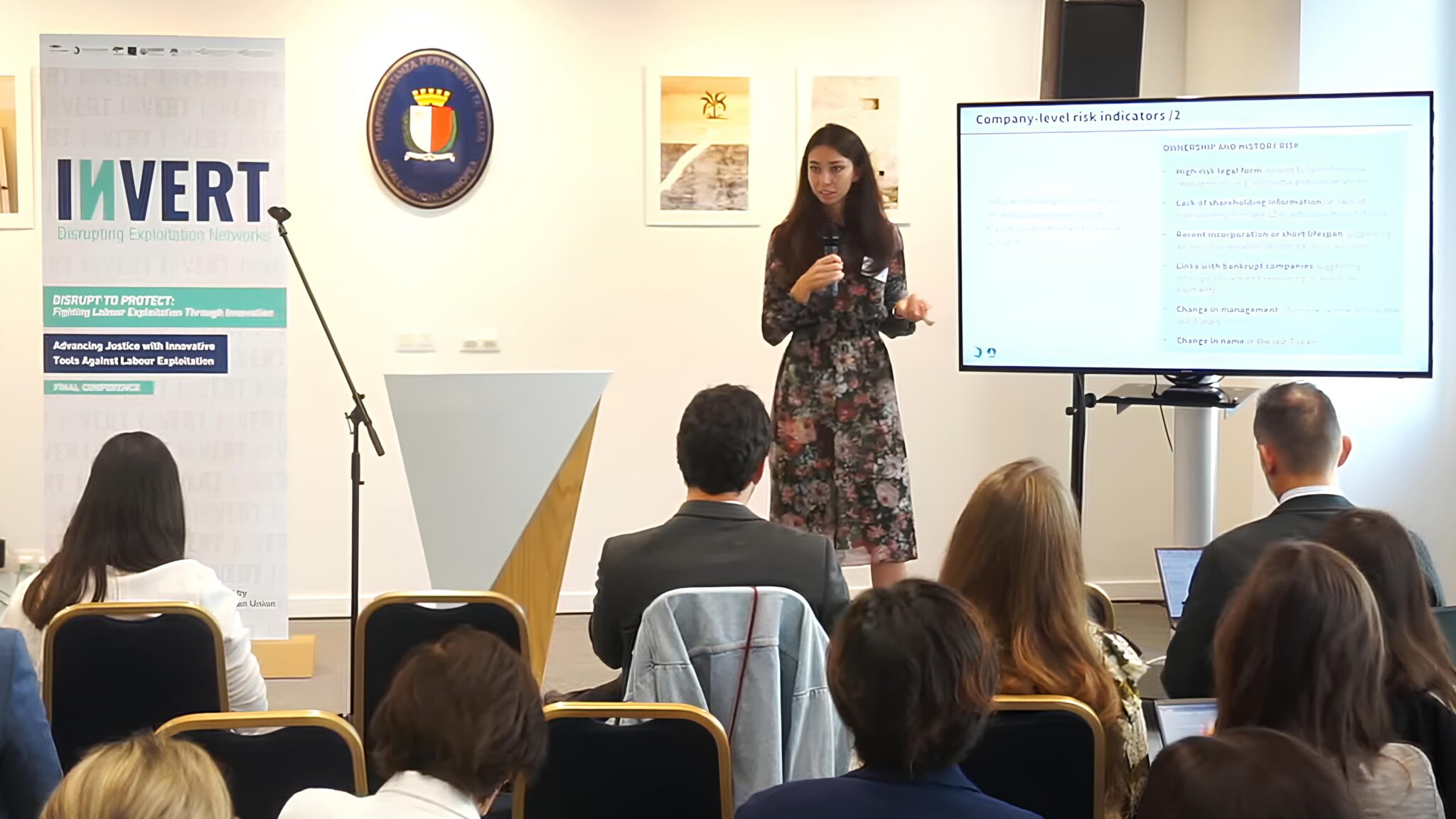Professor Ernesto Ugo Savona Receives 2025 ESC Criminology Award
Today, our Director, Professor Ernesto Ugo Savona, was awarded the 2025 ESC European Criminology Award. Announced at the 25th annual conference of the European Society of Criminology in Athens, the award recognised his lifetime contribution to the field.
This prestigious tribute acknowledged his achievements over his 55-year academic career, his role in international policymaking, the establishment of Transcrime over 30 years ago, and his visionary approach to the future of criminology. He was also President of the ESC in 2003-2004 (as recalled in this article marking the conference’s 25th anniversary).
In his acceptance speech, Professor Savona addressed the challenges facing the field in times of strong geopolitical instability. The laudatio and full speech is provided below.
Professor Catrien Bijleveld – laudatio
“Ladies and gentlemen, it is a great honor for me to present the laudatio for Professor Ernesto Savona. This year, a jury assessed a number of candidates who had been proposed for the ESC Lifetime Achievement Award. The jury was composed of three former ESC presidents: Professor Klaus Boers, Professor Josep Tamarit, and myself.
Juries often say that deciding is difficult, and I can confirm that this was certainly the case for our committee this year. We had many strong candidates, and in evaluating them, we considered their contributions to European criminology, theoretical criminology, and the breadth, originality, and quality of their publications, including the journals in which they were published. We also looked at the solidity and recognition of each candidate’s research profile.
The jury reviewed and discussed the candidates’ wider contributions to the discipline, assessing engagement in advisory roles—for instance, for EU and UN bodies—their impact on policy, community, institutional service, active academic citizenship, and capacity building. This includes contributions to developing criminological infrastructure, leadership in universities, and educating future criminological scholars.
This year, the committee unanimously proposed Professor Ernesto Savona for the award for the following reasons:
Professor Savona, one of the founders of the ESC, has had a stellar academic career spanning almost 55 years, with his first publication in 1971. He has authored approximately 150 publications, of which about 60 are in English. He founded Transcrime, a world-renowned institute, which he has not only built but sustained and developed and secured over many years. Today, it is an established and the go-to hub for research on organized crime.
His research has been outstanding and sophisticated, including contributions to empirical research such as the development of the crime risk assessment mechanism and methods for assessing the vulnerability of legal sectors. Professor Savona has mentored a large number of disciples raised at Transcrime, and his authority is reflected in his frequent consulting work for supranational and international organizations such as the EU and the UN.
So, I would now like to move on to the presentation of the award to Professor Savona. I ask him to come up and invite the President of the ESC to present it to him”.
Professor Ernesto Savona
“Good afternoon, and thank you very much for this unexpected award. My sincere thanks also go to those who proposed my name and to the committee for their decision.
In this speech, I will reflect on my lifetime contribution by highlighting key moments of my career, focusing on two main journeys. The first is my teaching journey. I have taught at five universities. I began in Palermo, where I earned my degree in Law in 1965, and then moved on to the field of sociology of law at the University of Rome La Sapienza, then at the Faculty of Law at the University of Trento, and later at the Faculty of Political Science of the Catholic University of Milan. I concluded my teaching career at the University of Palermo.
My career, therefore, began and ended in Palermo, and some of my research topics have also been connected to Sicily and Palermo. My first research focus was on the effectiveness of laws and sanctions against organized crime, which started in Palermo. The second arose from my collaboration with Ron Clarke on situational crime prevention, particularly on what we call “crime-proofing”—reducing opportunities for organized crime. The third topic was the measurement of organized crime risk, which remains today a central aim of my research.
A key aspect of my work has been connecting research with policy. I have contributed to anti-crime strategies across Europe and internationally. Together with Phil Williams, I prepared the foundational work for the UNTOC conventions while I was at the National Institute of Justice in Washington, D.C. We developed three key documents for the UN, one of which introduced deregulation as an instrument for combating crime. In 2011, in Mexico, we tested an organized crime risk framework, and I am grateful to INEGI and the UNODC for allowing Transcrime to conduct this experiment in setting up a theoretical framework.
Starting from 2003, we continued this work at Transcrime in Trento and later at the Catholic University of Milan. We participated in several European Union research framework programs, across the 6°,7°, Horizon 2020 and Horizon Europe Research Programme. Today, Transcrime is running 18 projects under the European umbrella. I am particularly proud of a recent three-year contract from the European Commission’s External Relations to study organized crime risk beyond European borders. This project, conducted in collaboration with INTERPOL and and GI-TOC, allows us to focus on understanding and assessing the risks of organized crime infiltration in non-European contexts.
All of this has been possible thanks to the cooperation of my young colleagues at the University of Trento in the early years, when Transcrime was first set up in 1994, and today at the Catholic University of Milan, where Transcrime has been based since 2010. My gratitude also goes to the many external collaborators who have supported Transcrime from outside the institution.
I would also like to thank Springer, who has supported my work as Editor-in-Chief of the European Journal on Criminal Policy and Research. This journal brings together the two dimensions that I care most about: research and policy. I have been working on this since 2003.
Let me now address what we might call the future challenges for European criminology. I am one of the founding fathers of the ESC, established 25 years ago, and I feel that I have a responsibility to think about the future generations of criminologists. There are two questions which, in my view, are crucial.
The first concerns the European cultural identity. I believe it is very important to discuss and reinforce this identity in criminology, especially in times marked by vulgarity, arrogance, and disregard for human rights. We, as Europeans, have a particular responsibility to insist on these issues.
The second question concerns how we should reinterpret the future of security. Security is a term that is constantly debated, but it is caught between the threats of aggression on the one hand and the European Union’s capacity for defense at both national and international levels on the other.
When I was born, I was born with the hope of a progressive internationalization of crime prevention and control through multilateralism. I was strongly in favor of the establishment of a UNODC center in Vienna, and during my career I worked with the United Nations, the International Criminal Court, the Council of Europe, and EU institutions. It has always been part of my professional culture and personal story to be involved with international organizations.
Today, however, I am witnessing the ashes of these hopes. It is very strange: after 25 years of supporting multilateralism, I see it giving way to a parochial approach.
So, what about our future? What about your future, dear young colleagues, who are now confronted with new borders, protectionism, tariffs, and a weakened multilateral system? Does this mean something for us? I believe we need to share not only a profound disappointment but also a call to action for European criminology.
The European Society of Criminology has already achieved much. Over the past 25 years, it has connected researchers from diverse cultural and linguistic backgrounds. This is a very positive achievement, as we see from the number of people gathered here today in Athens. We collaborate, exchange ideas, and work together on joint EU-funded projects that go well beyond the 27 EU member states. The European research program itself is much more open than being limited to those 27 countries.
The European Society of Criminology also reinforces our cultural tradition: we place human and civil rights at the core of criminal policy and policing. And, to borrow the title of a book by Ronald Dworkin, we are taking rights seriously. This is exactly what the European Society of Criminology should continue to take care of.
Taking rights seriously—speaking about human and civil rights—also means confronting the challenges ahead. These include the criminal use of generative AI and the limits of law enforcement research, the growing complexity of digital crimes, and above all the need for reliable, high-quality data. We must move beyond simple perception indexes—perceptions of corruption, perceptions of organized crime—and focus instead on robust measures. We must also clarify outputs versus outcomes, since the confusion in this terminology is enormous. Too often, people mistake outputs for outcomes, or outcomes for outputs.
Another challenge is evaluating laws and sanctions. All these points bring me to my final message: we need better conceptual frameworks. As researchers, we need better indicators and robust data, particularly for measuring the three key components of crime risk: threat, vulnerability, and harm.
Let me conclude with one final note. European criminology must strengthen its identity and defend the rights of citizens, prisoners, migrants, and all victims of violence. I believe that criminology needs democracy, and democracy needs criminology. Thank you very much”.

Latest news
View all news
Prevent and Detect – DATACROS III Training
“How to early-detect organised crime infiltration, corruption and fraud: red-flags and best practices” 14 November 2025 | 10.30 – 16.30 CET Webinar on Webex I processi di appalto pubblico, concessione di autorizzazioni locali e contratti di servizio sono target primari per le strategie di penetrazione…

Kick-off Meeting of SECURE: Strengthening the Rule of Law against Corruption
Corruption is a powerful driver of organised crime within the European Union, and the exposure of Member States has been highlighted by recent scandals. According to Europol’s recent report, today over 70% of the EU’s major criminal networks currently rely on corruption to move illicit assets, misappropriate public funds…

Outcomes from INVERT: A Risk-Based Tool Against Labour Exploitation
Labour exploitation has emerged as predominant purpose of human trafficking in Europe. A recent report from the European Commission revealed that the proportion of victims of human trafficking subjected to labour exploitation doubled between 2008 and 2023, now exceeding 40% of identified cases. During a recent meeting organised by…

Transcrime and Crime&tech at the XXV ESC Annual Conference
Eurocrim25 Conference: “Logos of crime and punishment” 3-6 September 2025 – Athens, Greece At the 25th Eurocrim Conference organised by the European Society of Criminology (ESC), researchers from Transcrime and Crime&tech will present our latest findings on issues including human trafficking, labour exploitation, organised crime, disinformation, the…

Fighting Labour Exploitation: Final INVERT conference
“Disrupt to Protect: Fighting Labour Exploitation Through Innovation” Date and time: 19 September 2025, h. 9:00 – 13:00 Location: Brussels – Online participation Final INVERT conference Labour exploitation persists across Europe, particularly in high-risk sectors characterised by complex supply chains and…

EMERITUS: investigative protocol and technologies to detect waste crime
Waste crimes, including waste dumping, trafficking, and illegal storage, are multifaceted environmental offences. Investigating them is challenging not only due to complex modi operandi and multiple actors involved, but also because their environmental impact is often not immediately visible. The Horizon Europe-funded project…
